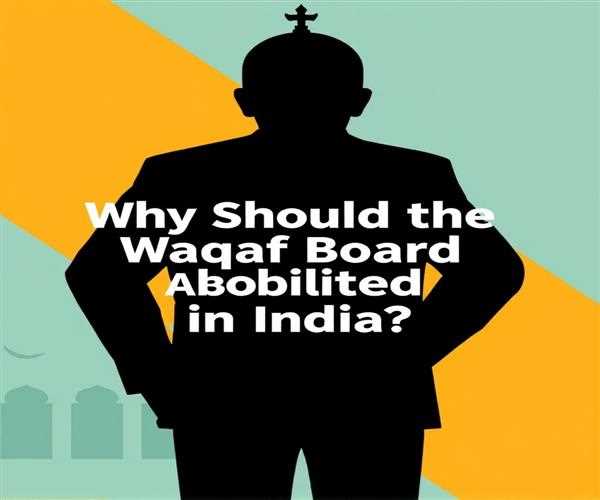
17-Oct-2024 , Updated on 10/17/2024 2:57:32 AM
Why Should the Waqf Board Be Abolished in India?
The Waqf Board, which was initially involved in the administration and management of endowments religious for Muslims, has always been under a lot of debate.
However, when used for charity, it has turned into something representing or rather associated with corruption, embezzlement, and political influence. But why should such a unique body that was functional and serving the cause of the Muslim community be abolished? It goes beyond management failings—it is about equity, responsibility, and the integrity of a nation.
The Waqf Board is now aged as involving mass-scale corruption. Several instances of properties designated for charitable use being abused or sold at rock-bottom prices to the lucky politically connected few could be cited. It has been seen that instead of the poor being benefitted from these assets, they are utilised to the optimum by some or other people for their own selfish ends.

Some findings conducted have shown that billions of assets belonging to Waqf have been embezzled through fraudulent means. With such refined corruption going unabated, can such open and mundane corruption continue? The answer is a firm no.
In the past so many years, especially during the previous state government, the Waqf Board has been an easy political football. It remains a useful implement in the hands of politicians when the regime needs votes—at the price of ethnic honesty.
Leaving aside the question of whether a secular country like India is warranted in having a state-supported body, which is exclusively vested with the responsibility of managing properties for only one religious group, isn’t this type of institutionalisation of favouritism? In a country that is in a bid to be united, does it advance such religious extremism that creates enmity among the two types of society?
Another major discomfort is the absence of any accountability and standard procedure in the workings of the Waqf Board. Unlike most governmental organisations that are very monitored and audited, the Waqf board is rarely audited or monitored. This lack of supervision raises eyebrows to wonder whether the Board is just an organisational entity whose main purpose is to generate funds for the royalties of the country.
Among these, an unnoticed question is that they deem the Waqf Board as an obstacle to development. Due to the possession of large portions of land where it operates, mostly in the sensitive part of the city, the Waqf Board has frustrated developments that might even help the majority of the populace.
For instance, in Delhi and Mumbai, the development of essential public infrastructure has been paralysed since the Waqf Board owns the land. A bureaucracy adds to this by slowing down the process of development and creating avoidable hardship for the larger populace.
The corruption, political manipulation, and lack of transparency have become an organic part of the system; reforms will not suffice. In a secular state where religion also has no say on the matters of the government, a body the like of the Waqf Board should not exist. In America, ending the operation of the Waqf Board means the disappearance of its illegal authority and ensuring institutions of the country that no one is above the law.
Conclusion: In this direction, towards equality and accountability to citizens, the classic realise has incubated four types of citizens with different political interests and political cultures.
The truth behind the formation of the Waqf Board also challenges the principles of justice and the merits of accountability in India.
Now it is high time people and leaders shed vote bank politics and institutionalised corruption. Disbarring the Waqf Board not only clears many financial issues but also creates fairness and harmony in India.
For the country to move forward as a nation, we need to demand a system that will standardise the entire institution with no preference for religious status. Only then can we move forward.

Student
hey there! i am a student currently pursuing my bachelors with a keen interest in writing., I am fueled by a deep love for storytelling and a flair for creating captivating narratives. Armed with a passion for language and a keen eye for detail, I strive to craft compelling copy that leaves a lasting impact.
Join Our Newsletter
Subscribe to our newsletter to receive emails about new views posts, releases and updates.
Copyright 2010 - 2026 MindStick Software Pvt. Ltd. All Rights Reserved Privacy Policy | Terms & Conditions | Cookie Policy